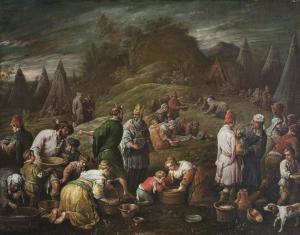 As we continue our traversal of the grand story of Israel’s exodus from Egypt and its journey toward the land of promise, today we watch the whole crowd, directly after their escape through the Sea of Reeds and their entry into the forbidding wilderness of Sinai, continue their basic attitude toward YHWH and toward Moses and Aaron; they love to complain! Older translations rendered the verb as “murmuring” or “grumbling,” but both readings seem too soft to capture what the word apparently means. The verb occurs only in the Hebrew Bible in the tales of the struggles of the people of Israel in the wilderness (Ex.15, 16, 17, Num.14, 16, 17 and Joshua 9:18). Their joyous celebration, led by Miriam after their escape from Egypt is short-lived (Ex.15); one step into the wilderness leads them to question why they left Egypt at all.
As we continue our traversal of the grand story of Israel’s exodus from Egypt and its journey toward the land of promise, today we watch the whole crowd, directly after their escape through the Sea of Reeds and their entry into the forbidding wilderness of Sinai, continue their basic attitude toward YHWH and toward Moses and Aaron; they love to complain! Older translations rendered the verb as “murmuring” or “grumbling,” but both readings seem too soft to capture what the word apparently means. The verb occurs only in the Hebrew Bible in the tales of the struggles of the people of Israel in the wilderness (Ex.15, 16, 17, Num.14, 16, 17 and Joshua 9:18). Their joyous celebration, led by Miriam after their escape from Egypt is short-lived (Ex.15); one step into the wilderness leads them to question why they left Egypt at all.
Hence, they complain, wail, grouse, gripe, squawk, grouch, or, if any of them had been British, they whinge. In short, the Israelites, only too happy to be led by Moses out of Egypt, now wish they were back there. The terrors of wilderness are too much. First, they ask, “what can we drink” (Ex.15:24)? Moses supplies them with water, the bitter waters of Marah made sweet by a magic piece of wood. But soon after having their thirst satisfied, second, their rumbling stomachs lead to any of the verbs supplied above; where is the food, they gripe? The tale of YHWH’s miraculous gift of food is the answer, but embedded in the story of God’s gift, we find the very human story of greed, an all too familiar tale to anyone willing to look in the mirror without flinching.
The tale about the food of YHWH begins with a very specific-sounding geographical series of locations that seem to pinpoint the precise location of Israel in the wilderness: they leave “Elim,” entering “the wilderness of Sin,” which we are told is “between Elim and Sinai” (Ex.16:1). Before we retrieve our GPS and put these coordinates into Waze, we need to recognize that we have not a clue about the existence or location any of these places! Earlier critics speculated mightily about each site, imagining Elim somewhere south of Suez (some 19th century explorers), and half a day’s journey from ‘Ain Hawarah, a supposed “brackish spring,” nicely like Marah in the story. Unfortunately, the existence of a brackish spring in 1850CE is a rather long time after the possible existence of such a place some 3000+years earlier! “Sin” (no, it has nothing to do with our English “sin”) is lost to history, and Sinai, though it has been searched for over three millennia, eludes our modern grasp. I know about the famous monastery of St. Catherine, at the supposed base of the sacred mountain, but that is only the purest speculation. Like the location of the Sea of Reeds, the jumping off spot before the entry of Israel into the wilds of the desert will never be found in our world. But, of course, that is no problem, because we are not dealing in history and geography here; we are in the land of fable, and what we are about to learn is a lesson we should never forget, though we have indeed forgotten and avoided it throughout human history.
Wherever these people are, “the whole congregation of the Israelites grouched against Moses and Aaron in the wilderness” (Ex.16:2). And their grouching is riddled with high humor. “If only we had died by YHWH’s hand in Egypt, where we rested near pots of (edible) flesh, and ate our fill of bread! You have brought us out into this wilderness to slaughter this entire assembly with hunger” (Ex.16:3)! My, their memories are clearly at odds with what we were told they experienced in the slave pits of Egypt. We heard nothing of calm respites near spits of flesh, nor satiated feasts of fine bread. What we remember was making bricks without straw, and fine dining had nothing to do with it! Are not these Israelites just slightly exaggerating their memories in order to make their piteous wilderness condition all the more appalling in their imaginations? Where are the meat and the bread, they cry, like we had in the halcyon days of Egyptian pleasures?
It is not only Moses who is listening to this Israelite lie about copious meat and bread in Egypt; YHWH has an ear cocked, too. You want meat and bread, do you? Ok, here they come. Of course, Moses stands between the people and their furious God more then once in the stories we will read, but here Moses twice warns the Israelites that their squawking is not really against Moses and Aaron but against YHWH. By implication, perhaps they should simply shut their mouths!

But YHWH answers their loud and hyperbolic demands anyway, and “in the evening quails came up and covered the camp (supplying the rabble with meat), and in the morning there was a layer of dew around the camp” (Ex.16:13). And when that dew lifted, “there on the surface of the wilderness was a fine flaky substance, as fine as ground frost” (Ex.16:14). And there is YHWH’s answer to supposed Egyptian bread. The dunderheads of Israel take a look at that flaky stuff, and with decided brilliance cry, “What is it?” And that is exactly what it is: manna, a single word that means “what is it?” This is another example of the refined sense of humor, both of the Israelite author and of YHWH. You want bread? I give you “what is it?” But now the lessons for the Israelites and us may begin, lessons we still have not learned.
Quails are one thing; they just fall into your traps, but manna must be gathered. Yet, it has some rather surprising qualities. No matter how much you gather, it is only just enough for you and your family for one day. If you gather a lot or only a little, no one has either too much or not enough (Ex.16:18). They only have access to what they need. No one may hoard manna, salting it away for sale to those without it, cornering the manna market for one’s own good. And this lesson is made doubly clear by the command that one may only gather manna for six days, because on the seventh day one simply must not gather, but instead must rest. If anyone attempts to go and gather manna on the seventh day, there will not be any to gather, and if one tries to gather more than one needs, the excess will rot and mold. The lesson is that the gift of God is for all, but the gift must never be stockpiled or hidden away for later sale or over-priced supply. It is finally impossible for anyone to have more than they actually need.
And that is the lesson for all time; greed is made impossible by God’s gift of manna. “And on the seventh day, some of the people went out to gather, and they found none” (Ex.16:27). Such an idea seems less than ridiculous in the light of the enormous disparities that our modern world presents between those who have much and those who have little. It remains horrifyingly true that 20 Americans control more wealth than about 50% of the poorest Americans; that means that 20 people have more than 165 million of their fellow citizens. How far we are from the gift of manna! How far we are from each having what we need. Especially now in the time of the COVID-19 virus, these vast disparities are only increasing. It certainly must be seen as one of the greatest sins of our modern life together. Not only do the Israelites howl about their lack of food and water, when YHWH provides both to them, they flaunt the commands of their God, and try to hoard and stockpile the gift for themselves. How naïve it sounds to us to think that God really does desire that all of God’s people have enough and that none should accumulate such great piles for themselves.
According to the Book of the Acts in the New Testament, the earliest Christian communities knew this truth from the book of Exodus. After Peter’s Pentecost speech brought 3000 people into the emerging community of the church, we are told that they “had all things in common; they would sell their possessions and goods and distribute the proceeds to all, to any who had need” (Acts 2:44-45). What an idea! A community where all needs are met, where all find what they need. The Bible really does challenge us all to think about the ways we have structured our world, and to ask whether or not our structures do in fact match the desires and will of the God we claim to worship. The lesson of the manna is potent even in our own modern day.
(Images from Wikimedia Commons)












